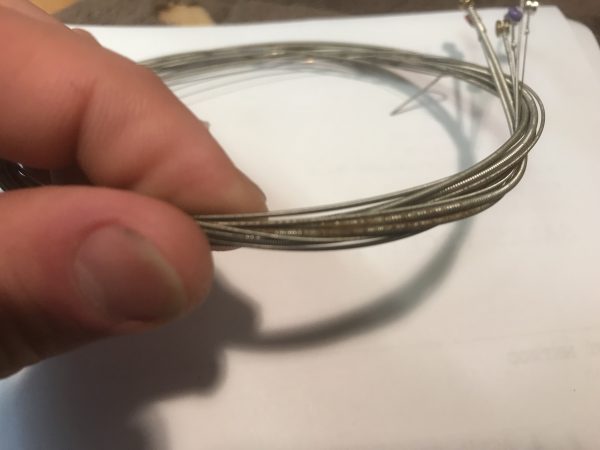While on the one hand this is a matter of personal taste, on the other hand there are some very concrete reasons to change strings often.
Regardless they should definitely be changed before they get to this point…
The case for personal taste: newer strings sound brighter, older strings are ‘warmer’ or duller. I am not particularly a fan of most strings right out of the package but after a day or two of playing that exaggerated brightness gives way to a crispness and clarity that, in my opinion, is the most satisfying to play. But some players I know aren’t happy with the sound of strings until months down the road. They tend to not change strings ever, if it can be helped. Some players change their strings after every show!
To extend the life of strings, in any case, I would recommend a couple of simple practices. First, wash your hands before you play! Especially immediately after eating, smoking, and coming in from the beach or the garden, etc. Second, wipe down your strings after you play. This may seem totally obsessive, but the gook and crud (yes those are the technical luthier terms) and the oil from your hands and the environment will hasten the corrosion of the metals.
Which brings me to the concrete, scientific argument for changing your strings at least somewhat regularly. The metal has a life span just like everything else. Manufacturers are very careful to ensure that the string is (ideally) perfectly consistent along its length in terms of density and dimension. Musical strings live the entirety of their working life under constant tension. If you bend strings a lot or change to alternate tunings that will also fatigue the metal. Think of taking any thin piece of steel (or plastic, wood, etc.) and bending and stretching it over and over again. It’s going to wear out eventually. Environmental conditions such as humidity, salty ocean air, and the aforementioned gook and crud from our hands, will eventually oxidize and corrode the material making it inconsistent along it’s length. Which kills tone (or… improves it to some people’s ears…) and it also means the string doesn’t really have much of a chance of intonating properly. For this reason we always replace the strings before doing the intonation on a guitar, if the strings show significant signs of wear.
I know plenty of you out there will stand by your old string sound, and I am not here to say are wrong in any way. Just, please, don’t let them rust right into the saddle, as was the case with these bad boys in the picture above.
